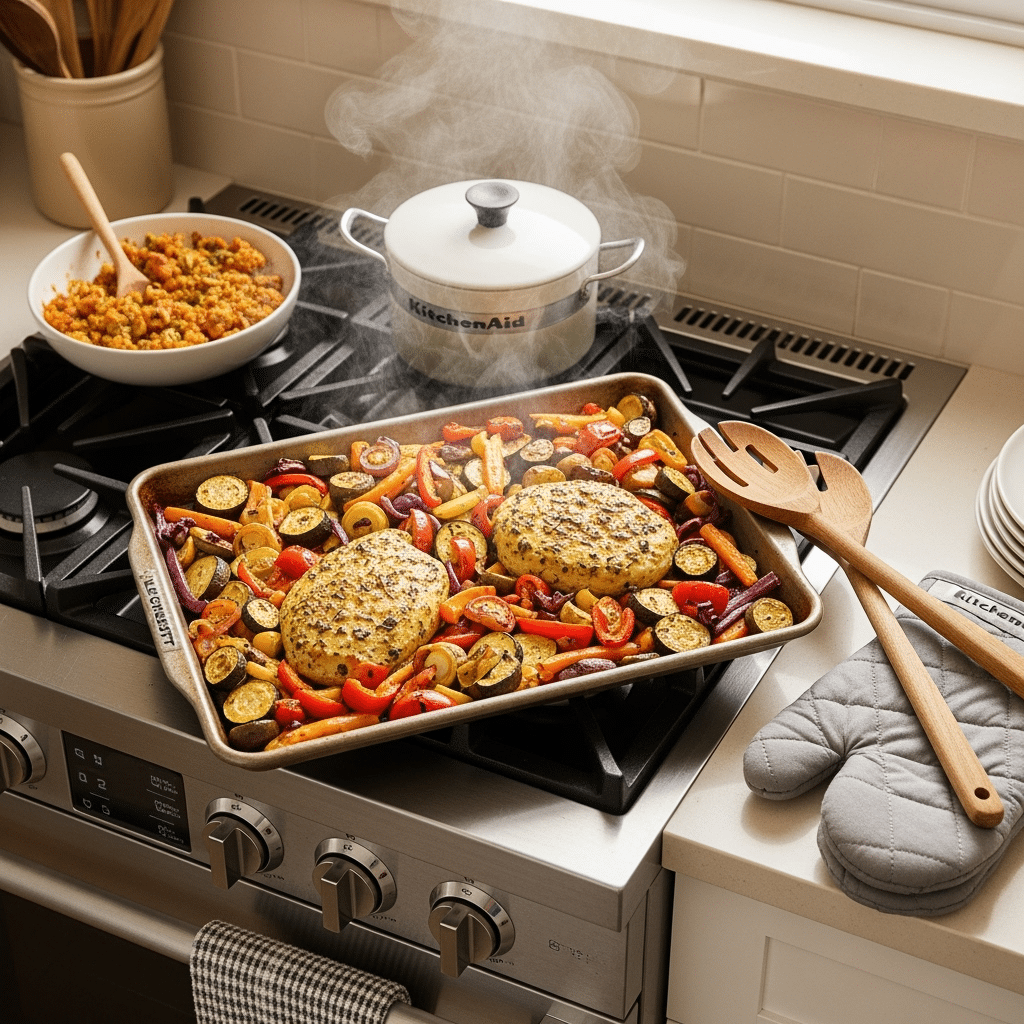In my kitchen, I’ve found a cooking method that changes busy weeknight dinners. Sustainable sheet pan dinners are perfect for those who want healthy meals without fuss. These meals are easy to make, use less energy, and cut down on kitchen waste.
Roasting proteins and veggies together makes cooking easy and tasty. For example, this sheet pan supper with broccoli, potatoes, and balsamic is a hit. It shows that green cooking can be both easy and yummy.
Sheet pan dinners make meal prep quick and easy. They’re great for people with little time. By using local, seasonal ingredients, we can make meals that are good for us and the planet.
Key Takeaways
- Sustainable sheet pan dinners reduce kitchen energy consumption
- One-pan meals minimize dish washing and food waste
- Seasonal ingredients enhance nutritional value
- Cooking method preserves nutrients through efficient roasting
- Eco-friendly cooking can be simple and delicious
Understanding the Magic of Sheet Pan Cooking
Sheet pan cooking has changed how we prep meals, making it easier and cleaner. It turns simple ingredients into tasty plant-based dishes with little effort.
I love cooking efficiently, and sheet pan dinners are perfect. They’re not just a cooking method. They’re a way to make quick, healthy meals for busy people.
Essential Equipment and Tools
Choosing the right tools is key for sheet pan cooking. Here’s what you need:
- Rimmed baking sheet (18×13 inches recommended)
- Parchment paper or silicone baking mat
- High-quality cooking spray
- Sharp chef’s knife
- Sturdy oven mitts
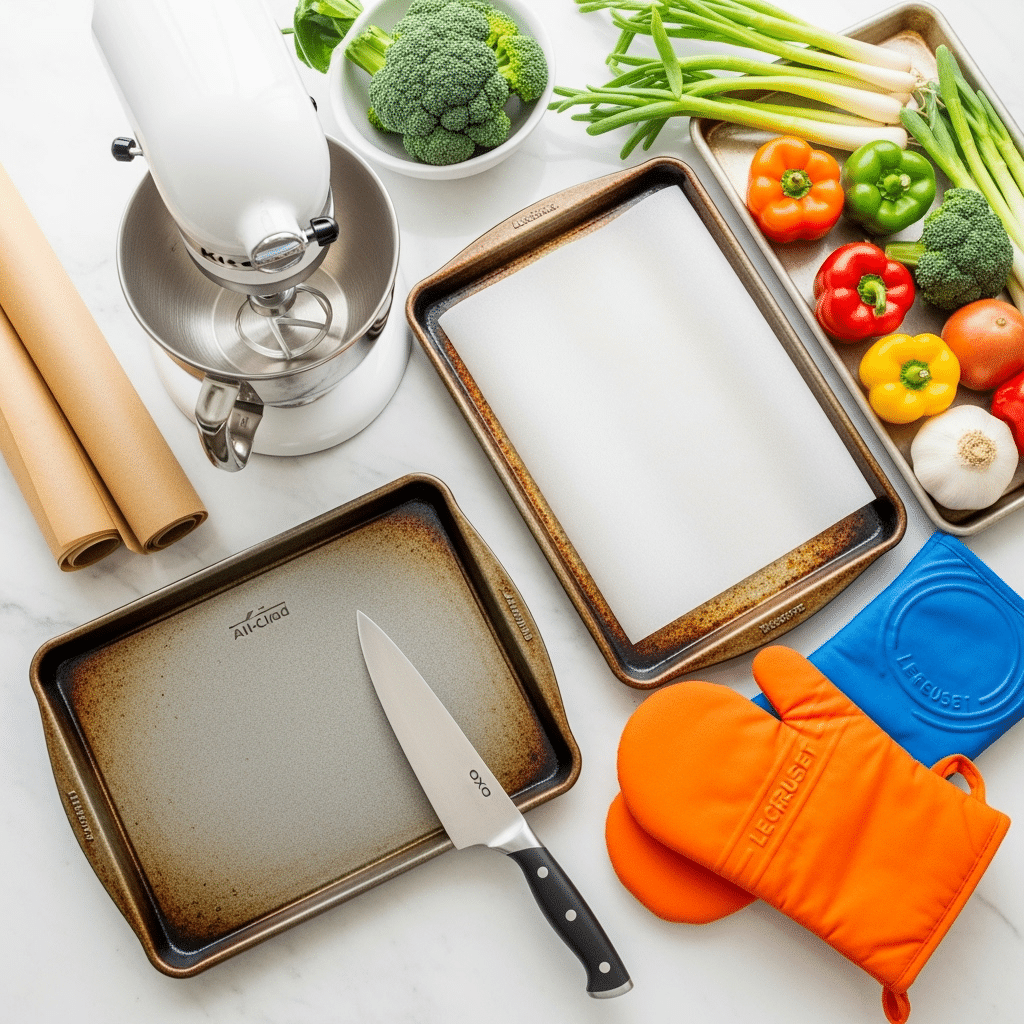
Benefits of One-Pan Cooking
One-pan cooking has many benefits for home cooks:
| Benefit | Description |
|---|---|
| Time Savings | Less prep and cleanup time |
| Energy Efficiency | Uses less electricity than other methods |
| Flavor Concentration | Ingredients roast together, improving taste |
Choosing the Right Sheet Pan Size
When picking a sheet pan, size is important. The best pan lets ingredients spread out evenly. An 18×13-inch pan is great for most recipes, serving 2-4 people.
Pro tip: Get a durable sheet pan for many recipes. It will last a long time.
Sustainable Sheet Pan Dinner Fundamentals
Starting a sustainable sheet pan dinner journey means embracing a zero-waste kitchen. I’ve learned that delicious meals can also be good for the planet. The secret is choosing ingredients that cut down on waste and boost flavor.
When planning vegetarian sheet pan dinners, I follow a few key rules:
- Choose locally sourced, seasonal produce
- Select plant-based proteins with low environmental impact
- Use whole vegetables to cut down on waste
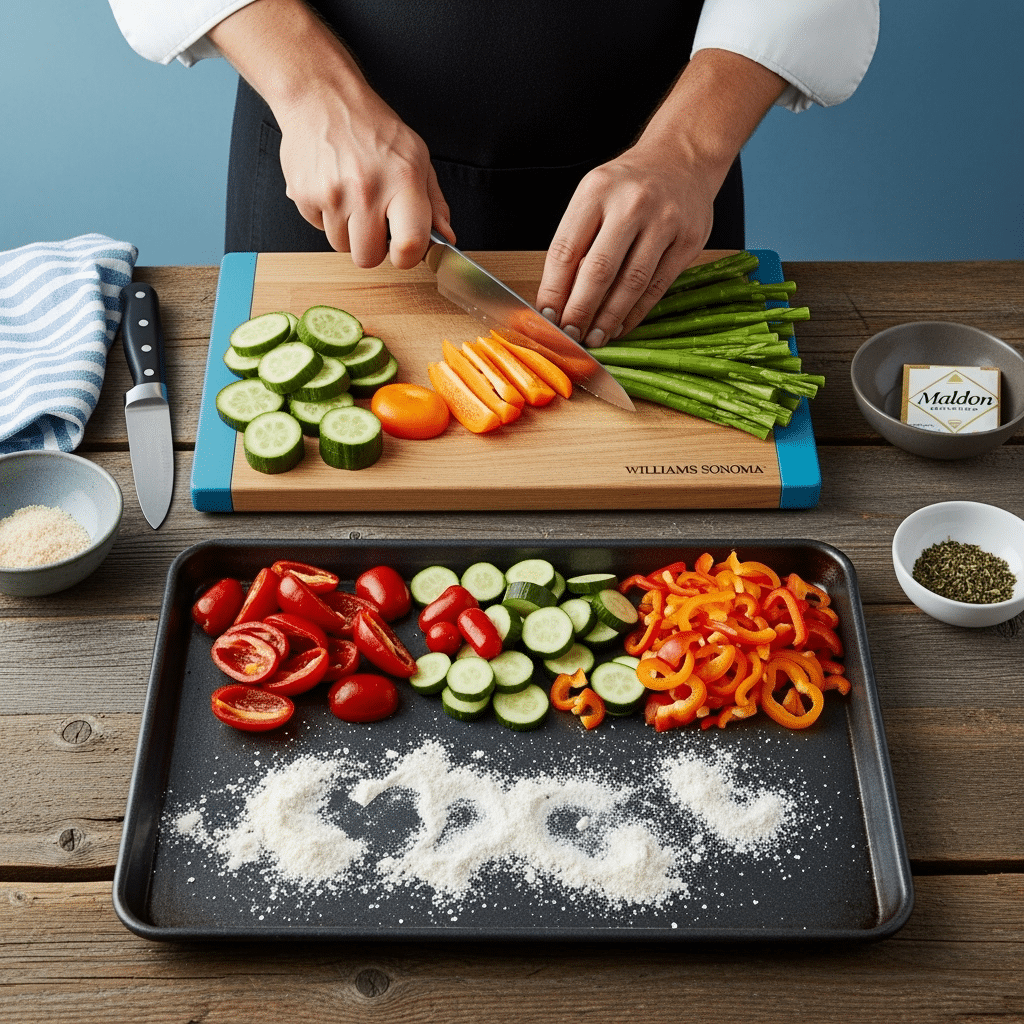
Sheet pan cooking is all about simplicity. Roasting vegetables and proteins together saves time and energy. I fill half the pan with lean proteins like tofu or legumes. The other half gets colorful, roasting-friendly veggies.
Mindful living is about being careful with what we choose. When I cook sheet pan meals, I aim to:
- Choose organic, locally grown ingredients
- Buy only what I’ll eat
- Use veggie scraps for stocks or compost
By following these eco-friendly cooking tips, you can turn your kitchen into a green space. It supports your health and the planet.
Creating Perfect Sheet Pan Combinations
Learning to make sheet pan dinners is key to eco-friendly cooking. These meals are healthy and easy to make. They also save time and effort in cleaning up.
To make a great sheet pan meal, choose ingredients that cook well together. Pick proteins and veggies that take the same time to cook. This ensures everything turns out right.
Protein and Vegetable Pairings
Good sheet pan dinners come from the right mix of proteins and veggies. Here are some top picks:
- Chicken breast with root vegetables
- Salmon with asparagus
- Tofu with bell peppers (great for vegetarian dishes)
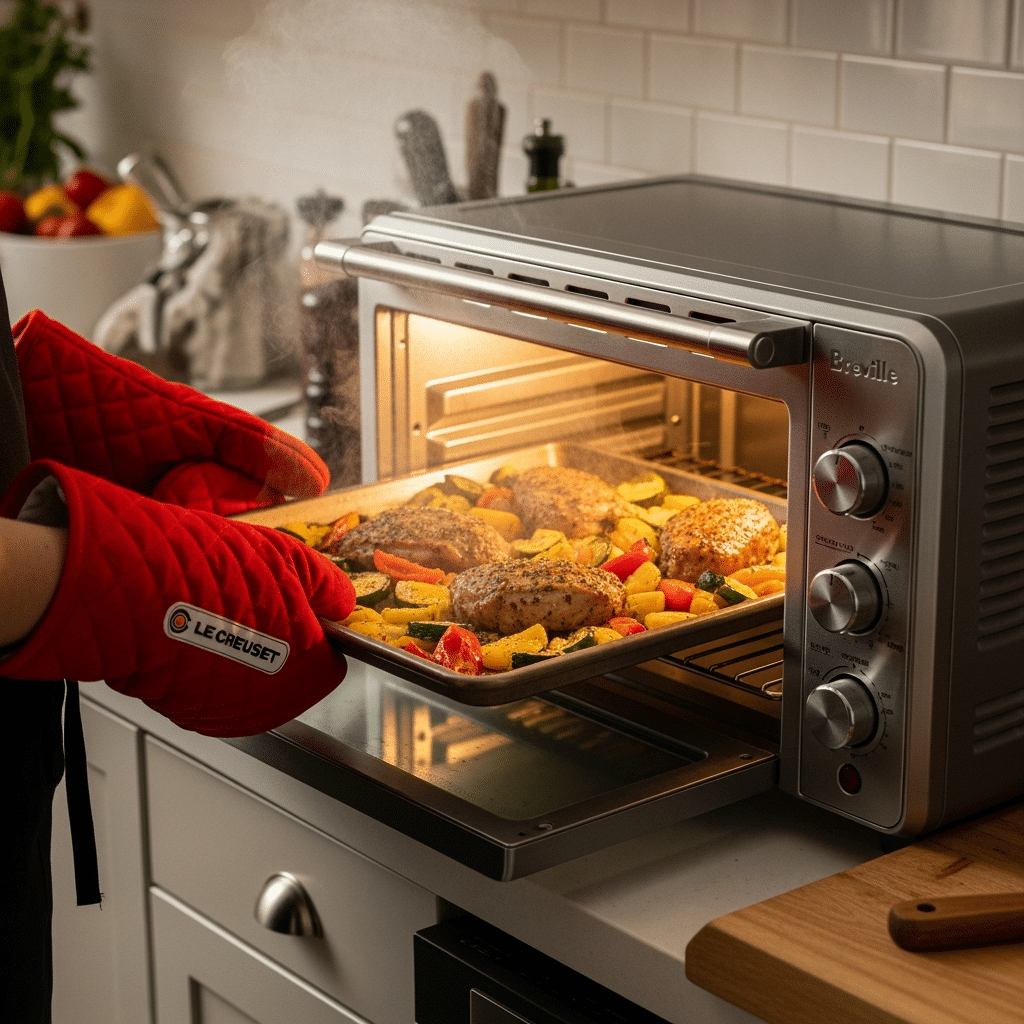
Seasoning and Marinade Options
Make your sheet pan meal stand out with the right seasonings. Try different marinades to turn simple foods into amazing dishes.
| Cuisine Style | Key Ingredients | Flavor Profile |
|---|---|---|
| Mediterranean | Olive oil, lemon, oregano | Bright, herbaceous |
| Asian-Inspired | Soy sauce, ginger, garlic | Umami, complex |
| Mexican-Style | Chili powder, cumin, lime | Spicy, tangy |
Cooking Time Management
For efficient cooking, arrange ingredients wisely. Pro tip: Put denser veggies in the middle and proteins on top for even heat.
Most ingredients cook well in 20-30 minutes at 400°F. This makes sheet pan dinners perfect for quick, healthy meals. They also support eco-friendly cooking.

Conclusion
My journey into sustainable sheet pan dinners has changed how I cook. These simple recipes are more than just food—they connect us to our food and the planet. They make cooking easy and help us eat well without much effort.
Sheet pan dinners are a blank slate for creativity. They’re perfect for anyone, whether you’re busy or just want to keep things simple. Using local ingredients makes meals taste better and helps local farmers. You can make different sheet pan dinners that fit your taste and health goals.
The best thing about these recipes is how easy and efficient they are. Cooking everything together saves time and reduces waste. It makes meals that are good for you and the planet. Start trying new things, trust your taste, and enjoy cooking in a way that’s good for you and the earth.
As you try more sheet pan dinners, remember each meal is a chance to live more mindfully. Making small changes in cooking can make a big difference for our health and the planet. Your kitchen becomes a place of creativity, sustainability, and tasty discoveries.

FAQ
What makes sheet pan dinners sustainable?
Sheet pan dinners are good for the planet because they use less energy. They also help reduce food waste by using ingredients wisely. Plus, they let you use fresh, local produce. This makes for a tasty, eco-friendly meal.
How can I make my sheet pan dinners more environmentally friendly?
To make your sheet pan dinners greener, choose local ingredients and seasonal veggies. Use plant-based proteins and reusable baking sheets. Try to use all parts of the vegetables and make little waste.
Are sheet pan dinners suitable for different dietary preferences?
Yes! Sheet pan dinners work for many diets. You can change proteins and ingredients to fit your needs. This way, you can enjoy a balanced meal that’s also good for the planet.
What equipment do I need to start making sheet pan dinners?
You’ll need a good sheet pan, preferably made from recycled materials. Also, get parchment paper or a silicone mat. Don’t forget basic tools like a knife and cutting board. These choices help you cook sustainably.
How can I prevent food from sticking to the sheet pan?
To avoid sticking, use parchment paper or a silicone mat. Lightly oil your veggies. Make sure to spread them out a bit. This helps cook everything evenly and makes cleanup easy.
Can sheet pan dinners be prepared in advance?
Yes! They’re great for meal prep. Chop veggies and prep marinades ahead of time. Then, assemble and cook when you’re ready. Many recipes also reheat well, perfect for busy days.
How do I ensure even cooking on a sheet pan?
For even cooking, cut ingredients the same size. Place longer-cooking veggies near the edges. Cook without overcrowding. Rotate the pan halfway through and plan cooking times for each ingredient.
Are sheet pan dinners healthy?
Sheet pan dinners can be very healthy. Focus on whole, nutrient-rich ingredients. Roasting veggies and lean proteins with little fat makes for a nutritious meal. It’s a mindful way to eat well.
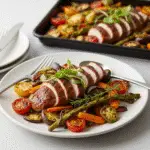
Sustainable Sheet Pan Dinners: 7 Easy Eco-Friendly Recipes for Busy Weeknights
- Total Time: 40 minutes
- Yield: 4 servings 1x
Description
Sustainable sheet pan dinners that reduce kitchen waste and energy consumption while creating delicious, nutritious meals using local, seasonal ingredients.
Ingredients
2 lbs mixed seasonal vegetables (broccoli, potatoes, bell peppers)
1 lb plant-based protein (tofu, tempeh, or legumes)
3 tbsp olive oil
2 tsp sea salt
1 tsp black pepper
2 tbsp balsamic vinegar
Fresh herbs for garnish
Instructions
1. Preheat oven to 400°F and line sheet pan with parchment paper
2. Chop vegetables into uniform pieces for even cooking
3. Toss vegetables and protein with olive oil, salt, and pepper
4. Arrange on sheet pan with space between pieces
5. Roast for 20-30 minutes until vegetables are tender and golden
6. Drizzle with balsamic vinegar and garnish with fresh herbs
7. Serve immediately while hot
Notes
Choose locally sourced, organic ingredients when possible
Adjust cooking times based on vegetable density
Store leftovers in refrigerator for up to 3 days
Perfect for meal prep and busy weeknight dinners
- Prep Time: 15 minutes
- Cook Time: 25 minutes
- Category: dinner
- Method: roasting
- Cuisine: healthy
Nutrition
- Serving Size: 1 portion
- Calories: 285
- Sugar: 8g
- Sodium: 590mg
- Fat: 12g
- Saturated Fat: 2g
- Unsaturated Fat: 10g
- Trans Fat: 0g
- Carbohydrates: 38g
- Fiber: 8g
- Protein: 14g
- Cholesterol: 0mg

